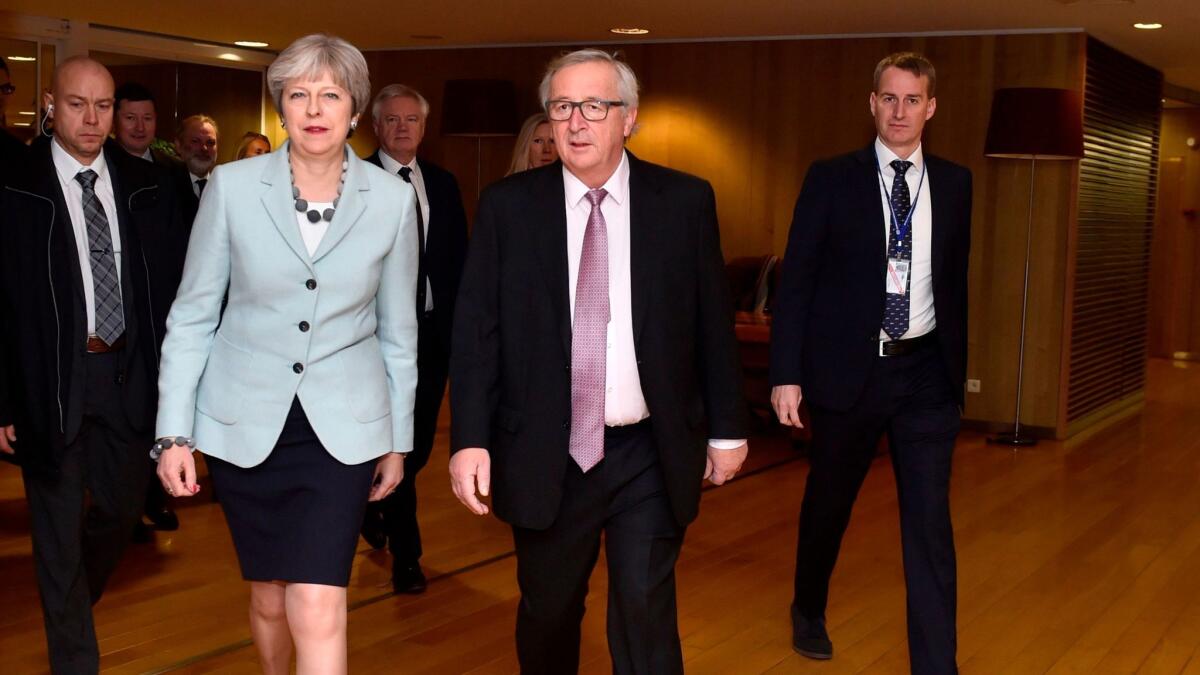Britain and the European Union declare a ‘Brexit’ breakthrough

- Share via
Reporting from London — Nearly 18 months after Britain voted to leave the European Union, Prime Minister Theresa May declared that a breakthrough had been reached in “Brexit” negotiations Friday so talks can finally turn to trade.
Standing beside European Commission President Jean-Claude Juncker after an early breakfast meeting in Brussels, she triumphantly said an agreement had been made that was in “the best interests of the whole of the U.K.” as it prepares to exit the European Union.
For the record:
2:10 p.m. Dec. 8, 2017A previous version of this report said that it had been more than 18 months since Britain voted to leave the European Union. That referendum was on June 23, 2016, less than 18 months ago. This article also incorrectly states that the “divorce bill” is reportedly around $53 million. The correct figure is $53 billion.
The proposed deal, published in a 15-page document, focuses on three key areas: the rights of the 3 million EU citizens living in the U.K. and the 1 million U.K. citizens living in the EU; the relationship between Northern Ireland, which will leave the EU along with mainland United Kingdom, and the Republic of Ireland, an EU member; and the “divorce bill” that Britain must pay in order to cease its membership.
“We have now made the breakthrough we needed,” Juncker said, adding that the result was “of course a compromise.”
He said he would recommend the deal be approved by the remaining 27 member states at a summit next week.
The announcement was lauded as a huge victory by May’s supporters.
A member of her Cabinet, Michael Gove, one of the lead campaigners for the “Leave” campaign for the June 2016 referendum, in which 52% voted to exit the EU and 48% to remain, said it was a “significant personal political achievement for the prime minister.”
Foreign Secretary Boris Johnson, another key Leave campaigner, also praised May’s “determination.”
“We now aim to forge a deep and special partnership with our European friends and allies while remaining true to the referendum result — taking back control of our laws, money and borders for the whole of the U.K.,” he wrote on Twitter.
The early morning announcement also came as a massive relief for May, who had been in Brussels on Monday hoping to secure this exact deal, but was forced to leave empty-handed after talks fell apart late in the day.
The crucial sticking point had been securing agreement on how the post-Brexit landscape will look between the Republic of Ireland and Northern Ireland.
Politicians on all sides have repeatedly said they do not want Brexit to see a return to a hard border between the two regions, which were marred by 30 years of sectarian conflict until the Good Friday agreement was signed in 1998.
But suggestions on Monday that the deal being struck would see Northern Ireland receive special status and stay within the customs union and single market while the rest of the United Kingdom left both were quickly shot down.
Northern Ireland’s staunchly pro-Brexit Democratic Unionist Party, which May is currently dependent on to maintain a majority in Parliament, announced Monday that it was not happy with the terms being proposed, and government leaders in Wales and Scotland as well as London Mayor Sadiq Khan said if Northern Ireland were granted some sort of half-in, half-out arrangement, they too would seek such a deal.
The majority of voters in Scotland and London voted to remain part of the EU in the referendum.
Speaking on Friday morning after this new deal was announced, DUP leader Arlene Foster said she had negotiated directly with the prime minister overnight and was happy that substantive changes had been made to the Northern Ireland deal that meant her party could now broadly support it.
Crucially, the joint report from the negotiators guaranteed that no hard border will emerge between Northern Ireland and the Irish Republic, but also that “no new regulatory barriers” will exist between Northern Ireland and the rest of the United Kingdom.
It also says that Northern Ireland’s businesses will retain the same “unfettered access” to the U.K.’s internal market after Brexit.
“For me, it means there is no red line down the Irish Sea,” Foster said. “We have the very clear confirmation that the entirety of the United Kingdom is leaving the European Union, leaving the single market, leaving the customs union and I think that’s a very important statement to have.”
However, she added that there was still “more work to be done” on many of the specifics of the border issue, which required clarification before her party could guarantee how it would vote on the final deal.
Friday’s developments come after months of tense and often ill-tempered negotiations and a night of telephone diplomacy for May, who flew to Brussels in the early hours to meet Juncker face to face.
“Getting to this point has required give and take on both sides,” May said.
Juncker’s chief of staff Martin Selmayr posted a photo of white smoke emanating from a chimney when the breakthrough finally came around 6 a.m.
In terms of the divorce bill, a figure was not revealed Friday morning, but it is reportedly about $53 million.
And regarding the rights of EU citizens in the U.K., and vice versa, the deal protects their right to live, work and claim access to benefits in the country they reside in.
But the European Court of Justice will be the ultimate arbiter of their rights for eight years after the final Brexit deal is agreed upon, a clause that has angered many hard-core Brexit supporters who campaigned in the referendum for Britain to “take back control” of the country’s courts and borders.
“It’s pathetic,” said Nigel Farage, former leader of the UK Independence Party. “We will stay part of the European Court of Justice for a further eight years, which is one of the key reasons people actually voted Brexit.... It’s just not good enough.”
If the current deal is approved by the remaining 27 members of the EU, they will give the go-ahead for Brexit talks to turn to the complex issue of trade.
That development was welcomed by the markets and business leaders. The British pound rose to a six-month high against the euro.
But there were also early warnings from many corners that even though this first round of negotiations is over, much hard work remains - and those negotiations could prove to be even more fraught.
“We all know that breaking up is hard,” European Council President Donald Tusk said. “But breaking up and building a new relation is much harder.”
Boyle is a special correspondent.
UPDATES:
6:45 a.m.: This article was updated throughout with staff reporting and additional details.
This article was originally published at 12:20 a.m.
More to Read
Sign up for Essential California
The most important California stories and recommendations in your inbox every morning.
You may occasionally receive promotional content from the Los Angeles Times.









